Business Ethics Assignment: Child Labor, Whistleblowing, Uber Analysis
VerifiedAdded on 2019/10/30
|6
|1672
|230
Essay
AI Summary
This essay delves into three key areas of business ethics: child labor, whistleblowing, and the ride-sharing service Uber. The analysis of child labor explores the ethical considerations of its legality, referencing the ILO's definition and the situation in Bolivia, while also mentioning the Nestle case. The discussion on whistleblowing examines the ethical dilemmas faced by whistleblowers, distinguishing between motivated and unmotivated actions and using Edward Snowden as a case study. The essay then analyzes Uber's business model, highlighting its advantages in terms of convenience and efficiency while also critiquing its negative impacts on the taxi industry, labor market, and passenger safety, concluding that the company is primarily driven by profit motives.
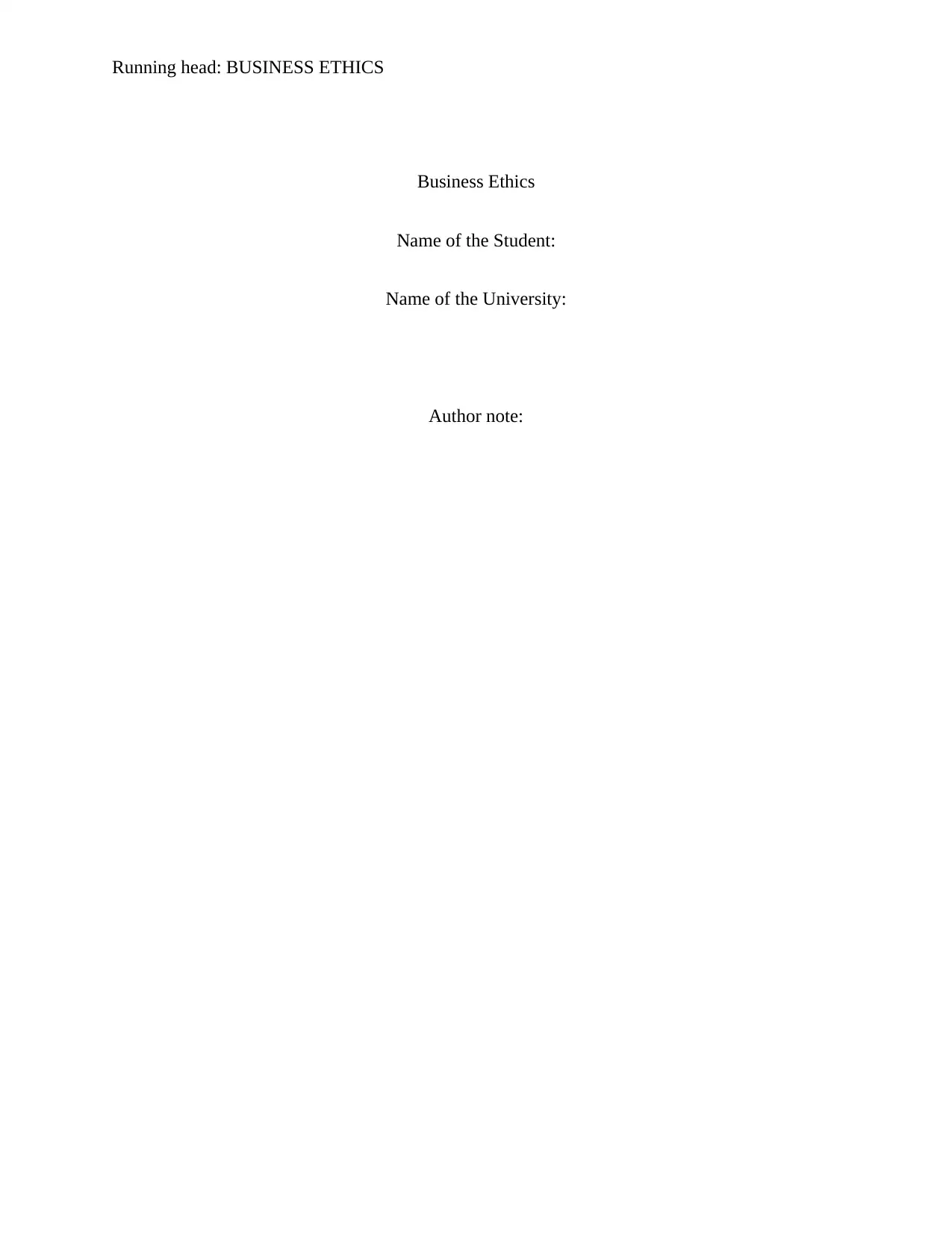
Running head: BUSINESS ETHICS
Business Ethics
Name of the Student:
Name of the University:
Author note:
Business Ethics
Name of the Student:
Name of the University:
Author note:
Paraphrase This Document
Need a fresh take? Get an instant paraphrase of this document with our AI Paraphraser
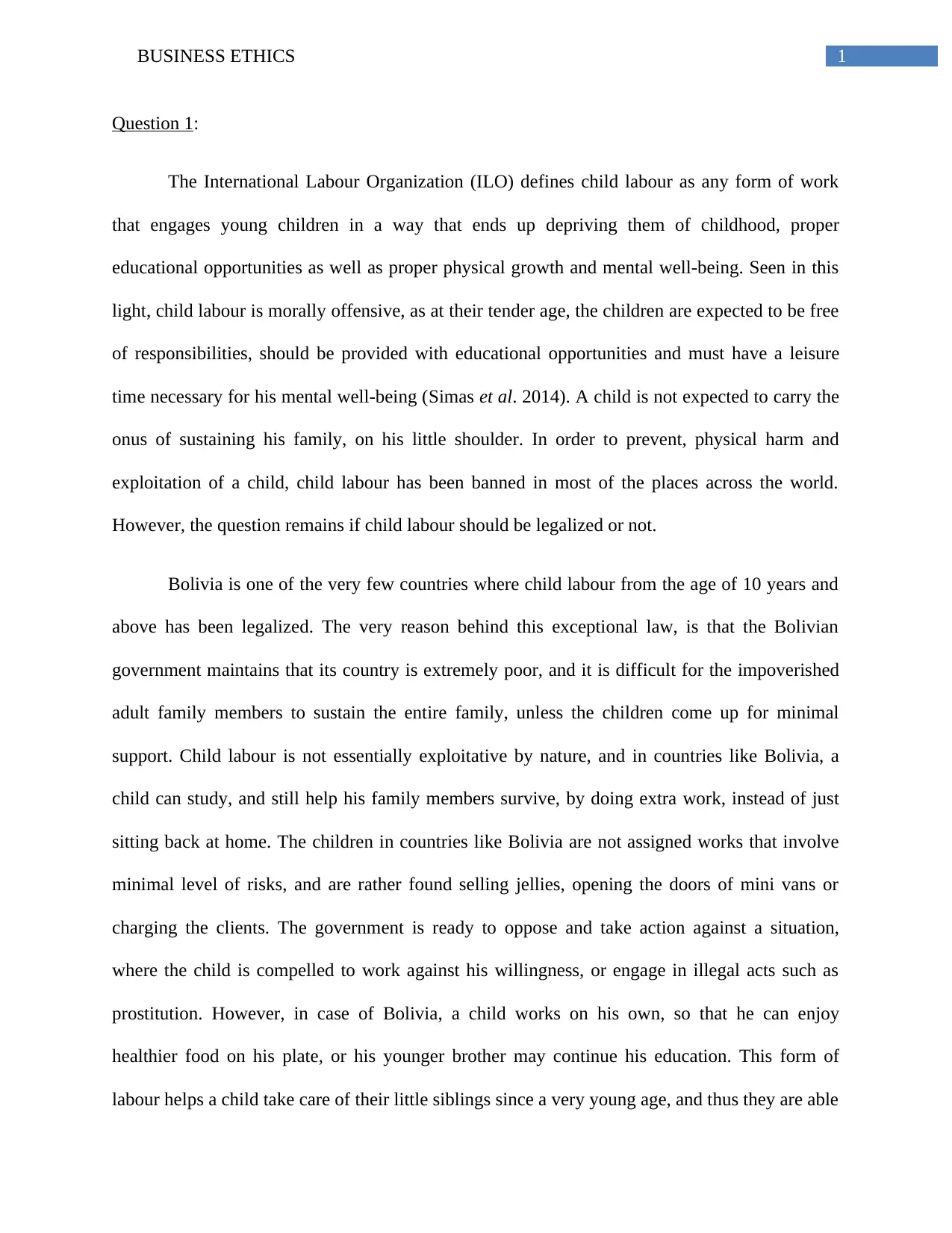
1BUSINESS ETHICS
Question 1:
The International Labour Organization (ILO) defines child labour as any form of work
that engages young children in a way that ends up depriving them of childhood, proper
educational opportunities as well as proper physical growth and mental well-being. Seen in this
light, child labour is morally offensive, as at their tender age, the children are expected to be free
of responsibilities, should be provided with educational opportunities and must have a leisure
time necessary for his mental well-being (Simas et al. 2014). A child is not expected to carry the
onus of sustaining his family, on his little shoulder. In order to prevent, physical harm and
exploitation of a child, child labour has been banned in most of the places across the world.
However, the question remains if child labour should be legalized or not.
Bolivia is one of the very few countries where child labour from the age of 10 years and
above has been legalized. The very reason behind this exceptional law, is that the Bolivian
government maintains that its country is extremely poor, and it is difficult for the impoverished
adult family members to sustain the entire family, unless the children come up for minimal
support. Child labour is not essentially exploitative by nature, and in countries like Bolivia, a
child can study, and still help his family members survive, by doing extra work, instead of just
sitting back at home. The children in countries like Bolivia are not assigned works that involve
minimal level of risks, and are rather found selling jellies, opening the doors of mini vans or
charging the clients. The government is ready to oppose and take action against a situation,
where the child is compelled to work against his willingness, or engage in illegal acts such as
prostitution. However, in case of Bolivia, a child works on his own, so that he can enjoy
healthier food on his plate, or his younger brother may continue his education. This form of
labour helps a child take care of their little siblings since a very young age, and thus they are able
Question 1:
The International Labour Organization (ILO) defines child labour as any form of work
that engages young children in a way that ends up depriving them of childhood, proper
educational opportunities as well as proper physical growth and mental well-being. Seen in this
light, child labour is morally offensive, as at their tender age, the children are expected to be free
of responsibilities, should be provided with educational opportunities and must have a leisure
time necessary for his mental well-being (Simas et al. 2014). A child is not expected to carry the
onus of sustaining his family, on his little shoulder. In order to prevent, physical harm and
exploitation of a child, child labour has been banned in most of the places across the world.
However, the question remains if child labour should be legalized or not.
Bolivia is one of the very few countries where child labour from the age of 10 years and
above has been legalized. The very reason behind this exceptional law, is that the Bolivian
government maintains that its country is extremely poor, and it is difficult for the impoverished
adult family members to sustain the entire family, unless the children come up for minimal
support. Child labour is not essentially exploitative by nature, and in countries like Bolivia, a
child can study, and still help his family members survive, by doing extra work, instead of just
sitting back at home. The children in countries like Bolivia are not assigned works that involve
minimal level of risks, and are rather found selling jellies, opening the doors of mini vans or
charging the clients. The government is ready to oppose and take action against a situation,
where the child is compelled to work against his willingness, or engage in illegal acts such as
prostitution. However, in case of Bolivia, a child works on his own, so that he can enjoy
healthier food on his plate, or his younger brother may continue his education. This form of
labour helps a child take care of their little siblings since a very young age, and thus they are able
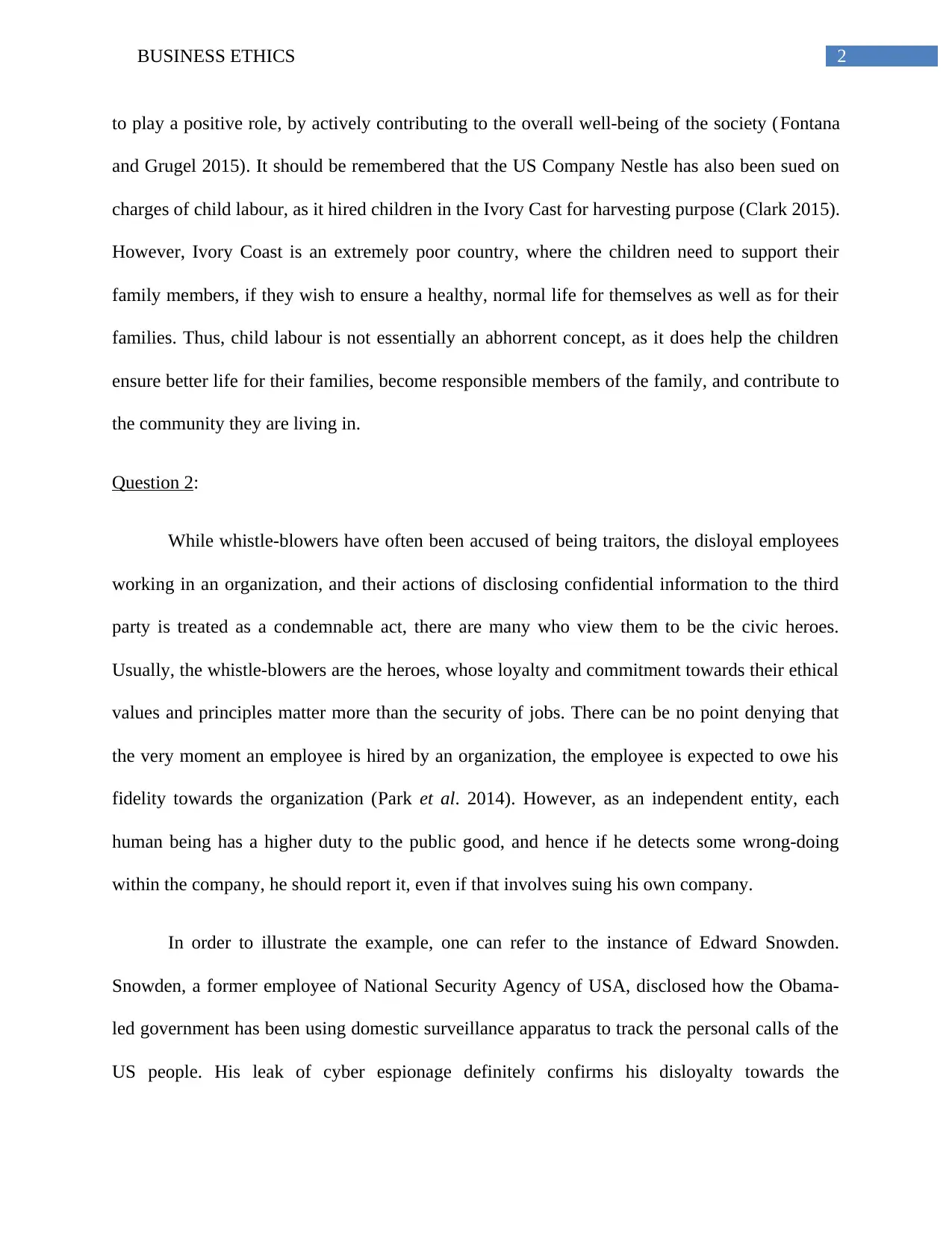
2BUSINESS ETHICS
to play a positive role, by actively contributing to the overall well-being of the society (Fontana
and Grugel 2015). It should be remembered that the US Company Nestle has also been sued on
charges of child labour, as it hired children in the Ivory Cast for harvesting purpose (Clark 2015).
However, Ivory Coast is an extremely poor country, where the children need to support their
family members, if they wish to ensure a healthy, normal life for themselves as well as for their
families. Thus, child labour is not essentially an abhorrent concept, as it does help the children
ensure better life for their families, become responsible members of the family, and contribute to
the community they are living in.
Question 2:
While whistle-blowers have often been accused of being traitors, the disloyal employees
working in an organization, and their actions of disclosing confidential information to the third
party is treated as a condemnable act, there are many who view them to be the civic heroes.
Usually, the whistle-blowers are the heroes, whose loyalty and commitment towards their ethical
values and principles matter more than the security of jobs. There can be no point denying that
the very moment an employee is hired by an organization, the employee is expected to owe his
fidelity towards the organization (Park et al. 2014). However, as an independent entity, each
human being has a higher duty to the public good, and hence if he detects some wrong-doing
within the company, he should report it, even if that involves suing his own company.
In order to illustrate the example, one can refer to the instance of Edward Snowden.
Snowden, a former employee of National Security Agency of USA, disclosed how the Obama-
led government has been using domestic surveillance apparatus to track the personal calls of the
US people. His leak of cyber espionage definitely confirms his disloyalty towards the
to play a positive role, by actively contributing to the overall well-being of the society (Fontana
and Grugel 2015). It should be remembered that the US Company Nestle has also been sued on
charges of child labour, as it hired children in the Ivory Cast for harvesting purpose (Clark 2015).
However, Ivory Coast is an extremely poor country, where the children need to support their
family members, if they wish to ensure a healthy, normal life for themselves as well as for their
families. Thus, child labour is not essentially an abhorrent concept, as it does help the children
ensure better life for their families, become responsible members of the family, and contribute to
the community they are living in.
Question 2:
While whistle-blowers have often been accused of being traitors, the disloyal employees
working in an organization, and their actions of disclosing confidential information to the third
party is treated as a condemnable act, there are many who view them to be the civic heroes.
Usually, the whistle-blowers are the heroes, whose loyalty and commitment towards their ethical
values and principles matter more than the security of jobs. There can be no point denying that
the very moment an employee is hired by an organization, the employee is expected to owe his
fidelity towards the organization (Park et al. 2014). However, as an independent entity, each
human being has a higher duty to the public good, and hence if he detects some wrong-doing
within the company, he should report it, even if that involves suing his own company.
In order to illustrate the example, one can refer to the instance of Edward Snowden.
Snowden, a former employee of National Security Agency of USA, disclosed how the Obama-
led government has been using domestic surveillance apparatus to track the personal calls of the
US people. His leak of cyber espionage definitely confirms his disloyalty towards the
⊘ This is a preview!⊘
Do you want full access?
Subscribe today to unlock all pages.

Trusted by 1+ million students worldwide
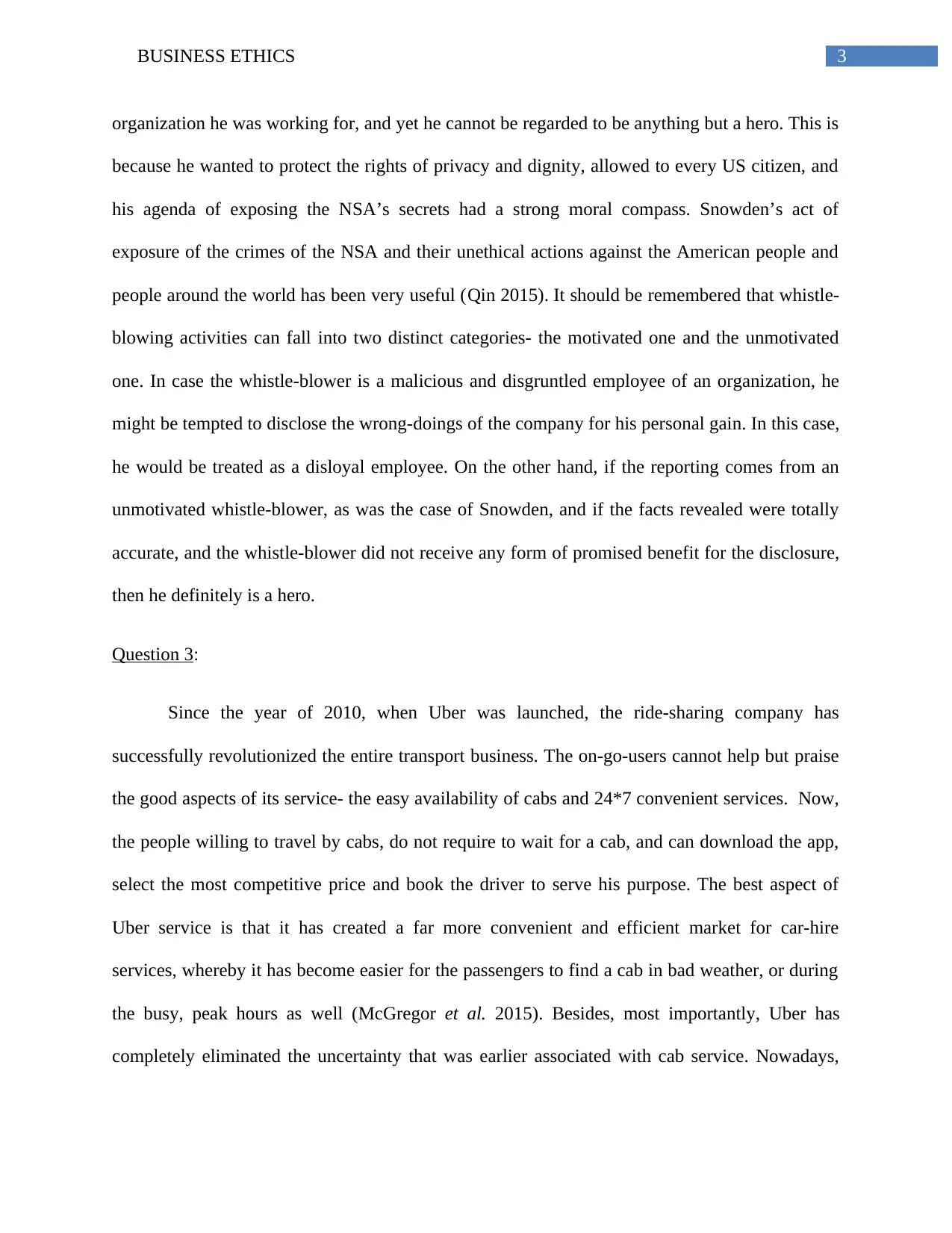
3BUSINESS ETHICS
organization he was working for, and yet he cannot be regarded to be anything but a hero. This is
because he wanted to protect the rights of privacy and dignity, allowed to every US citizen, and
his agenda of exposing the NSA’s secrets had a strong moral compass. Snowden’s act of
exposure of the crimes of the NSA and their unethical actions against the American people and
people around the world has been very useful (Qin 2015). It should be remembered that whistle-
blowing activities can fall into two distinct categories- the motivated one and the unmotivated
one. In case the whistle-blower is a malicious and disgruntled employee of an organization, he
might be tempted to disclose the wrong-doings of the company for his personal gain. In this case,
he would be treated as a disloyal employee. On the other hand, if the reporting comes from an
unmotivated whistle-blower, as was the case of Snowden, and if the facts revealed were totally
accurate, and the whistle-blower did not receive any form of promised benefit for the disclosure,
then he definitely is a hero.
Question 3:
Since the year of 2010, when Uber was launched, the ride-sharing company has
successfully revolutionized the entire transport business. The on-go-users cannot help but praise
the good aspects of its service- the easy availability of cabs and 24*7 convenient services. Now,
the people willing to travel by cabs, do not require to wait for a cab, and can download the app,
select the most competitive price and book the driver to serve his purpose. The best aspect of
Uber service is that it has created a far more convenient and efficient market for car-hire
services, whereby it has become easier for the passengers to find a cab in bad weather, or during
the busy, peak hours as well (McGregor et al. 2015). Besides, most importantly, Uber has
completely eliminated the uncertainty that was earlier associated with cab service. Nowadays,
organization he was working for, and yet he cannot be regarded to be anything but a hero. This is
because he wanted to protect the rights of privacy and dignity, allowed to every US citizen, and
his agenda of exposing the NSA’s secrets had a strong moral compass. Snowden’s act of
exposure of the crimes of the NSA and their unethical actions against the American people and
people around the world has been very useful (Qin 2015). It should be remembered that whistle-
blowing activities can fall into two distinct categories- the motivated one and the unmotivated
one. In case the whistle-blower is a malicious and disgruntled employee of an organization, he
might be tempted to disclose the wrong-doings of the company for his personal gain. In this case,
he would be treated as a disloyal employee. On the other hand, if the reporting comes from an
unmotivated whistle-blower, as was the case of Snowden, and if the facts revealed were totally
accurate, and the whistle-blower did not receive any form of promised benefit for the disclosure,
then he definitely is a hero.
Question 3:
Since the year of 2010, when Uber was launched, the ride-sharing company has
successfully revolutionized the entire transport business. The on-go-users cannot help but praise
the good aspects of its service- the easy availability of cabs and 24*7 convenient services. Now,
the people willing to travel by cabs, do not require to wait for a cab, and can download the app,
select the most competitive price and book the driver to serve his purpose. The best aspect of
Uber service is that it has created a far more convenient and efficient market for car-hire
services, whereby it has become easier for the passengers to find a cab in bad weather, or during
the busy, peak hours as well (McGregor et al. 2015). Besides, most importantly, Uber has
completely eliminated the uncertainty that was earlier associated with cab service. Nowadays,
Paraphrase This Document
Need a fresh take? Get an instant paraphrase of this document with our AI Paraphraser
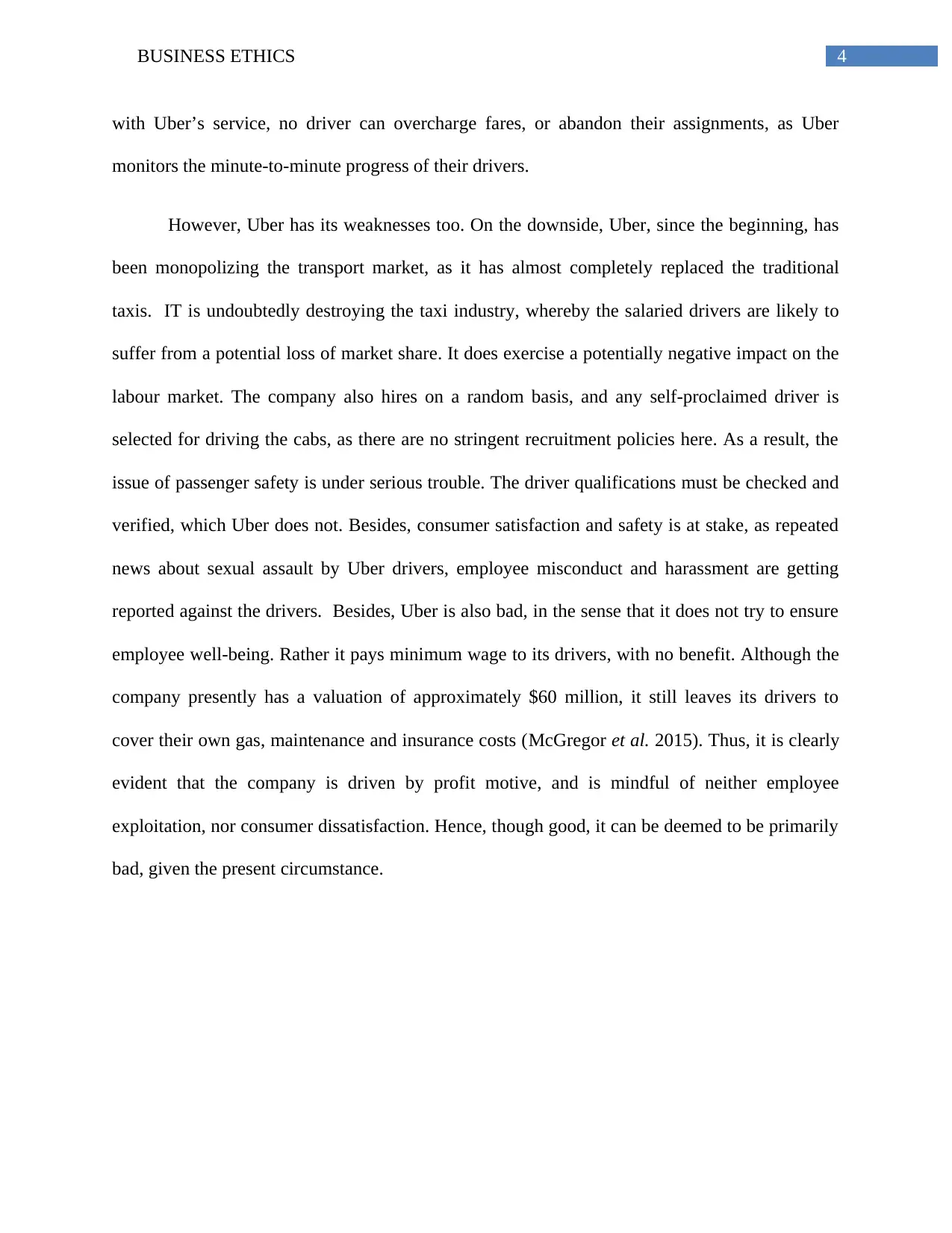
4BUSINESS ETHICS
with Uber’s service, no driver can overcharge fares, or abandon their assignments, as Uber
monitors the minute-to-minute progress of their drivers.
However, Uber has its weaknesses too. On the downside, Uber, since the beginning, has
been monopolizing the transport market, as it has almost completely replaced the traditional
taxis. IT is undoubtedly destroying the taxi industry, whereby the salaried drivers are likely to
suffer from a potential loss of market share. It does exercise a potentially negative impact on the
labour market. The company also hires on a random basis, and any self-proclaimed driver is
selected for driving the cabs, as there are no stringent recruitment policies here. As a result, the
issue of passenger safety is under serious trouble. The driver qualifications must be checked and
verified, which Uber does not. Besides, consumer satisfaction and safety is at stake, as repeated
news about sexual assault by Uber drivers, employee misconduct and harassment are getting
reported against the drivers. Besides, Uber is also bad, in the sense that it does not try to ensure
employee well-being. Rather it pays minimum wage to its drivers, with no benefit. Although the
company presently has a valuation of approximately $60 million, it still leaves its drivers to
cover their own gas, maintenance and insurance costs (McGregor et al. 2015). Thus, it is clearly
evident that the company is driven by profit motive, and is mindful of neither employee
exploitation, nor consumer dissatisfaction. Hence, though good, it can be deemed to be primarily
bad, given the present circumstance.
with Uber’s service, no driver can overcharge fares, or abandon their assignments, as Uber
monitors the minute-to-minute progress of their drivers.
However, Uber has its weaknesses too. On the downside, Uber, since the beginning, has
been monopolizing the transport market, as it has almost completely replaced the traditional
taxis. IT is undoubtedly destroying the taxi industry, whereby the salaried drivers are likely to
suffer from a potential loss of market share. It does exercise a potentially negative impact on the
labour market. The company also hires on a random basis, and any self-proclaimed driver is
selected for driving the cabs, as there are no stringent recruitment policies here. As a result, the
issue of passenger safety is under serious trouble. The driver qualifications must be checked and
verified, which Uber does not. Besides, consumer satisfaction and safety is at stake, as repeated
news about sexual assault by Uber drivers, employee misconduct and harassment are getting
reported against the drivers. Besides, Uber is also bad, in the sense that it does not try to ensure
employee well-being. Rather it pays minimum wage to its drivers, with no benefit. Although the
company presently has a valuation of approximately $60 million, it still leaves its drivers to
cover their own gas, maintenance and insurance costs (McGregor et al. 2015). Thus, it is clearly
evident that the company is driven by profit motive, and is mindful of neither employee
exploitation, nor consumer dissatisfaction. Hence, though good, it can be deemed to be primarily
bad, given the present circumstance.
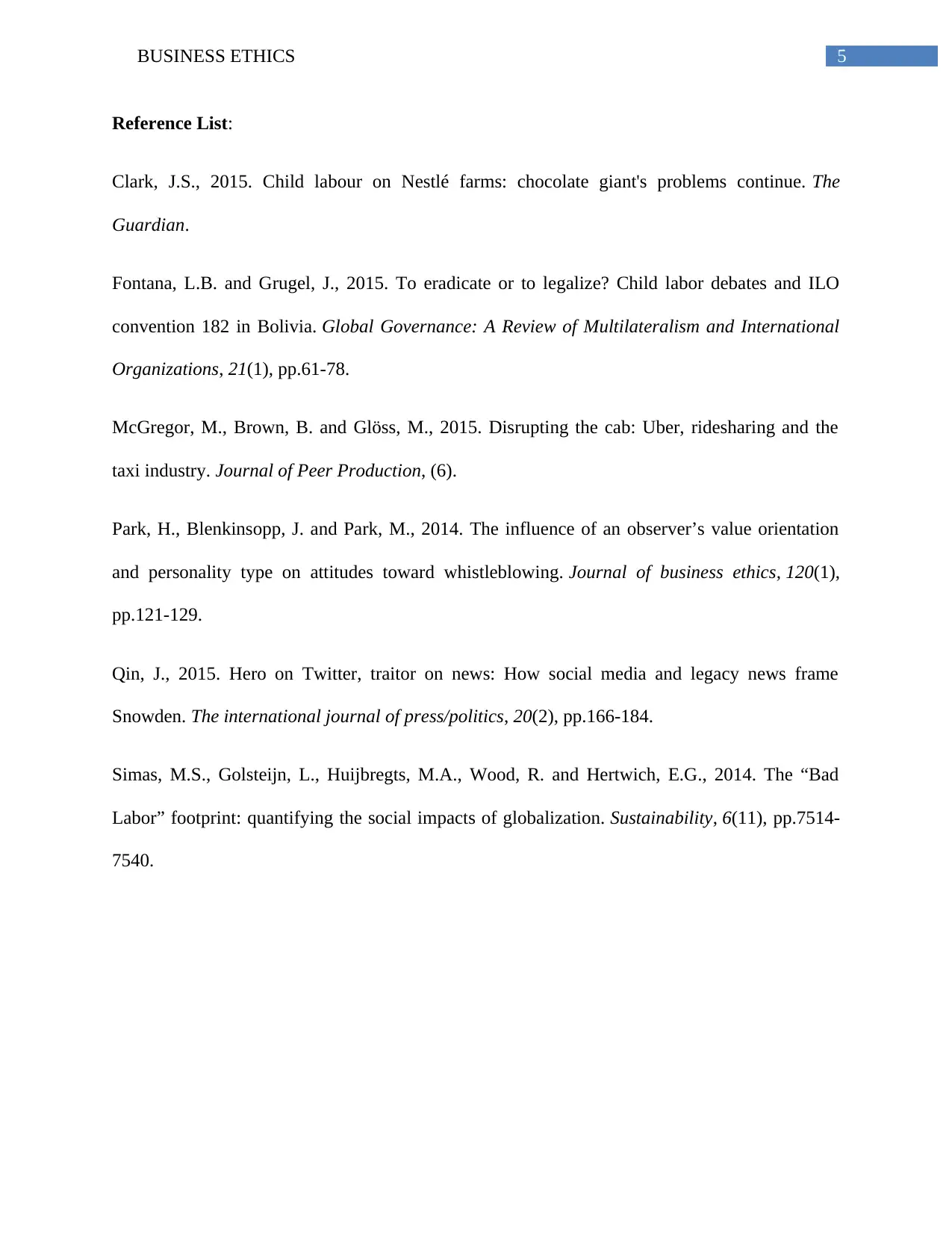
5BUSINESS ETHICS
Reference List:
Clark, J.S., 2015. Child labour on Nestlé farms: chocolate giant's problems continue. The
Guardian.
Fontana, L.B. and Grugel, J., 2015. To eradicate or to legalize? Child labor debates and ILO
convention 182 in Bolivia. Global Governance: A Review of Multilateralism and International
Organizations, 21(1), pp.61-78.
McGregor, M., Brown, B. and Glöss, M., 2015. Disrupting the cab: Uber, ridesharing and the
taxi industry. Journal of Peer Production, (6).
Park, H., Blenkinsopp, J. and Park, M., 2014. The influence of an observer’s value orientation
and personality type on attitudes toward whistleblowing. Journal of business ethics, 120(1),
pp.121-129.
Qin, J., 2015. Hero on Twitter, traitor on news: How social media and legacy news frame
Snowden. The international journal of press/politics, 20(2), pp.166-184.
Simas, M.S., Golsteijn, L., Huijbregts, M.A., Wood, R. and Hertwich, E.G., 2014. The “Bad
Labor” footprint: quantifying the social impacts of globalization. Sustainability, 6(11), pp.7514-
7540.
Reference List:
Clark, J.S., 2015. Child labour on Nestlé farms: chocolate giant's problems continue. The
Guardian.
Fontana, L.B. and Grugel, J., 2015. To eradicate or to legalize? Child labor debates and ILO
convention 182 in Bolivia. Global Governance: A Review of Multilateralism and International
Organizations, 21(1), pp.61-78.
McGregor, M., Brown, B. and Glöss, M., 2015. Disrupting the cab: Uber, ridesharing and the
taxi industry. Journal of Peer Production, (6).
Park, H., Blenkinsopp, J. and Park, M., 2014. The influence of an observer’s value orientation
and personality type on attitudes toward whistleblowing. Journal of business ethics, 120(1),
pp.121-129.
Qin, J., 2015. Hero on Twitter, traitor on news: How social media and legacy news frame
Snowden. The international journal of press/politics, 20(2), pp.166-184.
Simas, M.S., Golsteijn, L., Huijbregts, M.A., Wood, R. and Hertwich, E.G., 2014. The “Bad
Labor” footprint: quantifying the social impacts of globalization. Sustainability, 6(11), pp.7514-
7540.
⊘ This is a preview!⊘
Do you want full access?
Subscribe today to unlock all pages.

Trusted by 1+ million students worldwide
1 out of 6
Related Documents
Your All-in-One AI-Powered Toolkit for Academic Success.
+13062052269
info@desklib.com
Available 24*7 on WhatsApp / Email
![[object Object]](/_next/static/media/star-bottom.7253800d.svg)
Unlock your academic potential
Copyright © 2020–2026 A2Z Services. All Rights Reserved. Developed and managed by ZUCOL.





